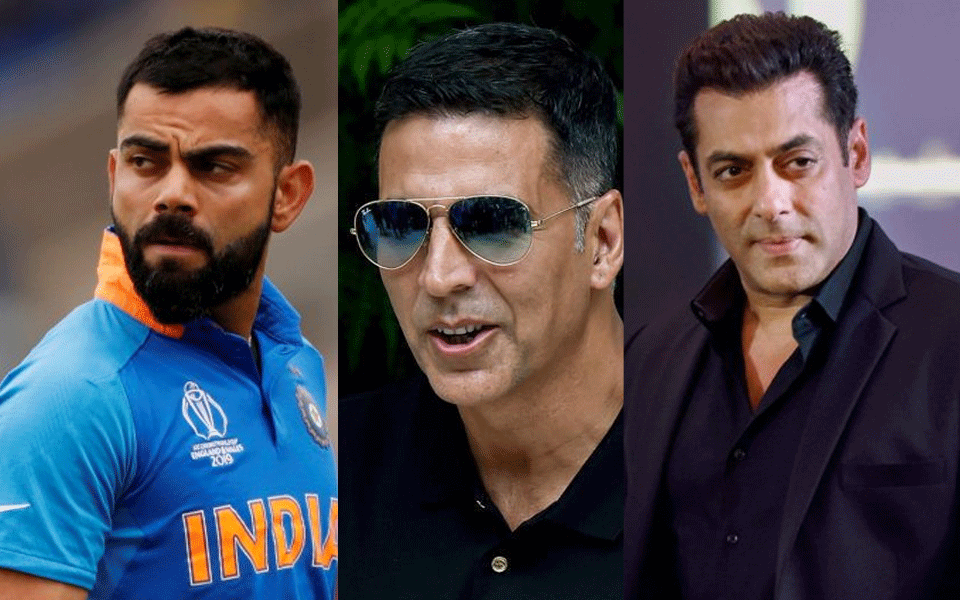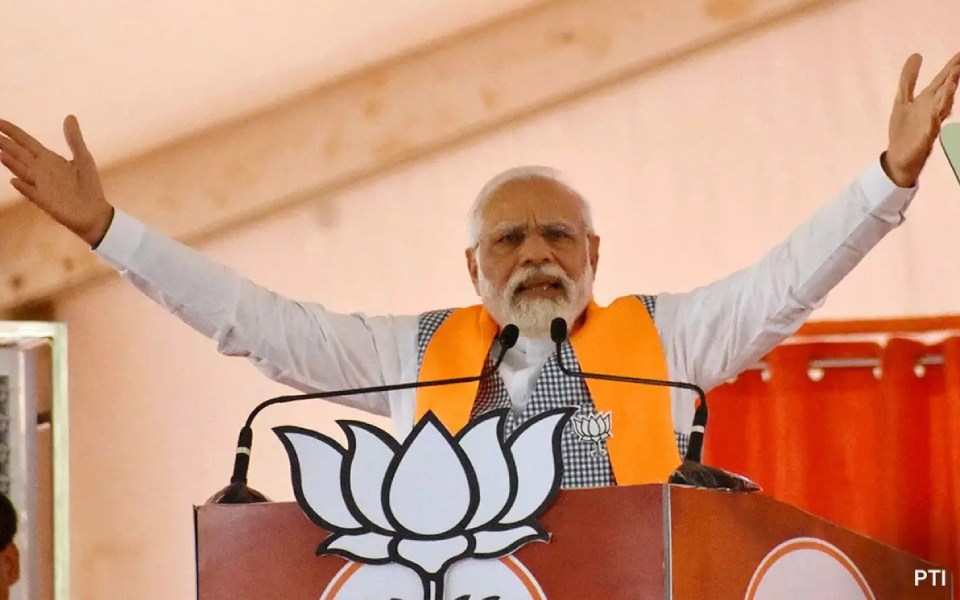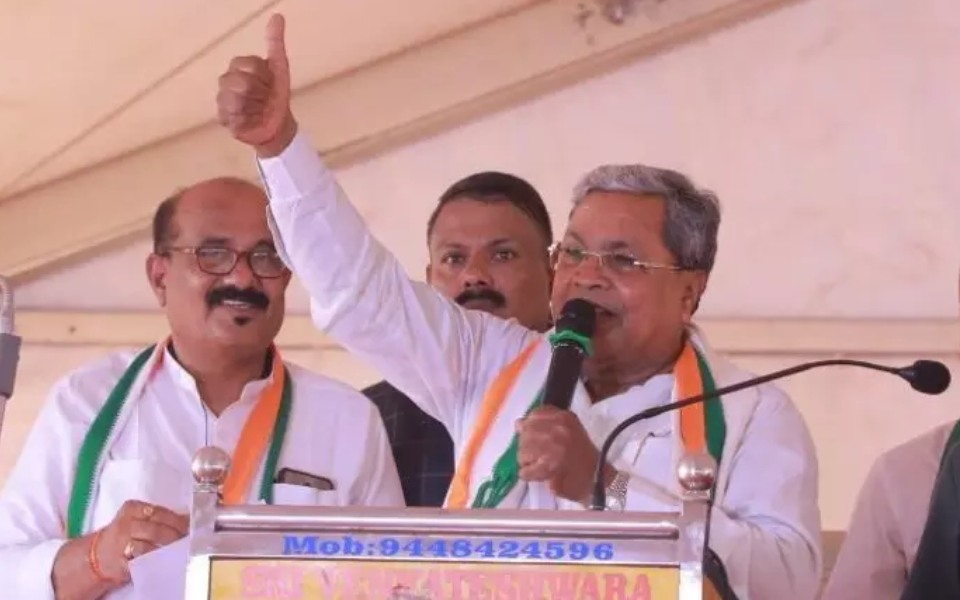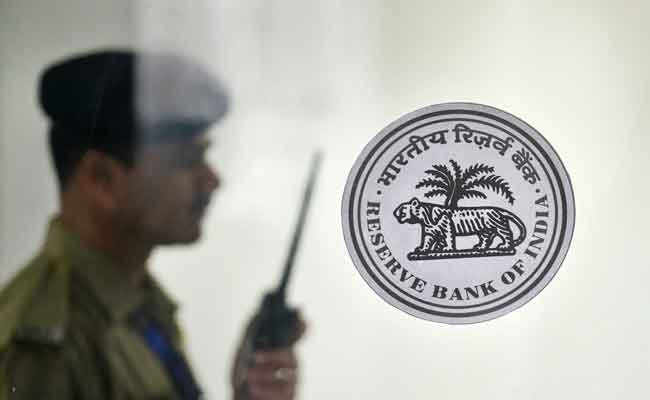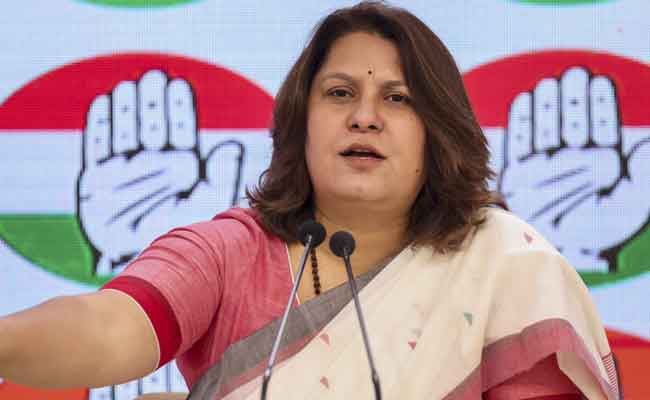Mumbai: Bollywood superstars Akshay Kumar and Salman Khan are among the top paid celebrities of India, Forbes India has announced.
The magazine has published its list of Celebrity 100 for the year 2019 which has been topped by Indian cricket captain Virat Kohli with the earning of Rs 252.72 crore.
The rankings are based on estimates of earnings through professions and endorsements of celebrities and estimates of their fame for the October 1, 2018 to September 30, 2019.
Akshay is highest earning star from the country with Rs 293.25 crore, registering a rise of 58.51 percent from the previous year, but is placed at the 2nd spot, followed by Salman with the earning of Rs 229.25 crore.
Megastar Amitabh Bachchan and Indian cricketer MS Dhoni are listed at 4th and 5th spots, with earnings of Rs 239.25 crore and Rs 135.93 crore, respectively.
They are followed closely by Shah Rukh Khan, who makes a comeback to the list, and Ranveer Singh, with the respective hauls of Rs 124.38 crores and Rs. 118.2 crores.
Despite all the talk about pay parity and inclusivity, the top-10 list has only two female stars and their earnings significantly lower than their male counterparts.
Alia Bhatt features at 8th with Rs 59.21 crore and Deepika Padukone at 10th with Rs 48 crore.
Cricket legend Sachin Tendulkar is placed 9th on the list with earning of Rs 76.96 crores. Forbes India noted that in the top 100 list, there was an improved representation from the South Indian film industry.
"There are 13 celebrities from the South this year (down from 15 in 2018) but their contribution to the cumulative earnings of the top 100 has increased to 12.57 percent from 11.26 percent in the previous year," it said.
"The inevitability of such lists being dominated by men, which itself tells a tale of the lack of pay parity across genders in every local film industry and in every sport.
"In cricket, a whopping Rs 6.5 crore separates top men players from the women when it comes to the central contract. But when it comes to performance, there is no gap," Brian Carvalho, Editor, Forbes India, in a statement.
Let the Truth be known. If you read VB and like VB, please be a VB Supporter and Help us deliver the Truth to one and all.
A group of civil society organisations on Tuesday met the Chief Electoral Officer of Karnataka and submitted a joint letter demanding action against Prime Minister Narendra Modi for the violation of Code of Conduct, Representation of People’s Act. 1951. Constitutional provisions and inciting hatred against the Muslim community to garner Hindu votes.
In a public meeting as a part of the BJP’s election campaign for the Lok Sabha Elections of 2024, in Banswara, Rajasthan, Mr. Modi delivered a speech ridden with false and divisive statements, inciting hatred against the Muslim community. In this event, the candidates from two Lok Sabha constituencies, Mahendrajeet Singh Malviya (Banswara Parliamentary 2 Constituency), Dr. Manna Lal Rawat (Udaipur Parliamentary Constituency), State BJP President CP Joshi along with Shri Narendra Modi and many BJP party leaders were present on stage.
He said that the Congress Manifesto speaks about surveying and then distributing the gold and silver of Hindus and Adivasis, to the Muslim community. He warns the Hindu audience, ‘Even your mangalsutras will not be safe.’ This false and inflammatory statement is aimed to polarize people on the basis of religion and seek the votes of Hindus while emotionally seeking to manipulate women through highlighting the stereotype of mangalsutra and husbands as their most important possession they need to protect. Another direct quote from his speech is:
“Pehle jab unki sarkar thi, unhone kaha tha ki desh ki sampatti par pehla adhikar Musalmano ka hai. Iska matlab, ye sampatti ikatthi karke kisko baatenge? Jinke zyada bacche hain, unko baatenge, ghuspaithiyon ko baatenge. Kya aapki mehnat ki kamayi ka paisa ghuspaithiyon ko diya jayega? Aapko manzoor hai yeh?”
(Earlier, when they (the Congress) were in power, they had said Muslims have the first right to the wealth of the nation. This means they will distribute this wealth to those who have more children, to infiltrators. Should your hard-earned money be given to infiltrators? Do you agree to this?)"
Eighteen years ago, after the Sachar report was published, indicating that Muslims were the most socio-economically vulnerable group of people in the country, Dr. Manmohan Singh had addressed the National Development Council in 2006. He had said, “I believe our collective priorities are clear: agriculture, irrigation and water resources, health, education, critical investment in rural infrastructure, and the essential public investment needs of general infrastructure, along with programmes for the upliftment of SC/STs, other backward classes, minorities and women and children. The component plans for Scheduled Castes and Scheduled Tribes will need to be revitalized. We will have to devise innovative plans to ensure that minorities, particularly the Muslim minority, are empowered to share equitably in the fruits of development. They must have the first claim on resources. The Centre has a myriad other responsibilities whose demands will have to be fitted within the over-all resource availability.”
“In a brazen attempt to distort that statement, Mr. Modi made provocative statements to misrepresent it, and use it to build a divisive and hateful narrative. Additionally, by referring to Muslims as ‘infiltrators’, he has clearly shown how the Bharatiya Janata Party views Muslims as outsiders and second-class citizens. By referring to them as ‘those who have more children’, he reinforced and promoted a stereotype which has been debunked by data multiple times. It is also evident that Narendra Modi is seeking to garner votes on the basis of religion and is effectively seeking the votes of the Hindu community by inciting hatred against the Muslim community.
“Not only are these dangerous and discredited stereotypes, they are a clear indication of an attempt to benefit out of a divisive and hateful narrative. Mr. Modi has violated several laws and guidelines that are in place to protect electoral democracy and our constitutional values.
“This brazen act to incite hatred with provocative statements by a person who has served as Prime Minister for 10 years, must be met with serious and immediate action,” the joint statement added.
Categorizing the violations in four parts, the letter added: Firstly, this attempt to incite hatred and exploit religious sentiments, by blatantly lying about another party’s manifesto is in violation of General Conduct (1), (2) and (3) of the Model Code of Conduct, which say:
(1): No party or candidate shall include in any activity which may aggravate existing differences or create mutual hatred or cause tension between different castes and communities, religious or linguistic.
(2): Criticism of other political parties, when made, shall be confined to their policies and programme, past record and work. Parties and Candidates shall refrain from criticism of all aspects of private life, not connected with the public activities of the leaders or workers of other parties. Criticism of other parties or their workers based on unverified allegations or distortion shall be avoided.
(3): There shall be no appeal to caste or communal feelings for securing votes. Mosques, Churches, Temples or other places of worship shall not be used as forum for election propaganda.
Secondly, he has violated Section 123(3), Section 123(3A), Section 123(4) and Section 125 of the Representation of the People Act, 1951, which say:
Section 123(3): The appeal by a candidate or his agent or by any other person with the consent of a candidate or his election agent to vote or refrain from voting for any person on the ground of his religion, race, caste, community or language or the use of, or appeal to religious symbols or the use of, or appeal to, national symbols, such as the national flag or the national emblem, for the furtherance of the prospects of the election of that candidate or for prejudicially affecting the election of any candidate:
Section 123(3A): The promotion of, or attempt to promote, feelings of enmity or hatred between different classes of the citizens of India on grounds of religion, race, caste, community, or language, by a candidate or his agent or any other person with the consent of a candidate or his election agent for the furtherance of the prospects of the election of that candidate or for prejudicially affecting the election of any candidate.
Section 123(4): The publication by a candidate or his agent or by any other person 9[with the consent of a candidate or his election agent], of any statement of fact which is false, and which he either believes to be false or does not believe to be true, in relation to the personal character or conduct of any candidate or in relation to the candidature, or withdrawal,10[*] of any candidate, being a statement reasonably calculated to prejudice the prospects of that candidate’s election
Section 125: Promoting enmity between classes in connection with election.—Any person who in connection with an election under this Act promotes or attempts to promote on grounds of religion, race, caste, community or language, feelings of enmity or hatred, between different classes of the citizens of India shall he punishable, with imprisonment for a term which may extend to three years, or with fine, or with both.
Thirdly, Advisory by ECI — On 1st March, 2024, the Election Commission of India issued an advisory to political parties on the “plummeting level of public discourse during campaigning”, urging parties to raise the level of election campaigning to “issue” based debates. The advisory also reiterates that the Moral code of Conduct has the force of law. Para 9 (i) and (ii) of the advisory state: 9(i) : No appeal shall be made on the basis of caste/ communal feelings of the electors. No activity, which may aggravate existing differences or create mutual hatred or cause tension between different castes/communities/religious/linguistic groups, shall be attempted.
9(ii): The political parties and leaders shall not make false statements, utterances without factual basis aimed at misleading the voters. Criticism of other parties or their workers on the basis of unverified allegations or on distortions shall be avoided.
Mr. Modi’s speech is clearly violative of both these clauses. Furthermore, Para 4 of the Advisory speaks about “star campaigners” as per Section 77 of the Representation of Peoples Act, 1951 wherein it lays down an “elevated duty to maintain highest standards of ethical conduct in the election campaign” Mr. Modi being a star campaigner for his party is duty bound to campaign responsibly and ensure that voters are not misguided. However, he has repeatedly resorted to using vicious communal rhetoric and disrupting harmony in the society. It is pertinent to note that being a public authority with a mass following and several million followers on social media as well, Mr. Modi’s statements have a significant effect on communal harmony. As such, due to his public position, Mr. Modi bears greater responsibility to refrain from hate mongering.
Fourthly, the statements made by Mr. Modi clearly fall within the ambit of Sections 153A of the Indian Penal Code that criminalises attacks upon the religion, race, place of birth, residence, language etc. By spreading rumors that seek to promote enmity between different religions, his speech also falls within the ambit of Section 505(2) of the IPC which states that Whoever makes, publishes or circulates any statement or report containing rumour or alarming news with intent to create or promote, or which is likely to create or promote, on grounds of religion, race, place of birth, residence, language, caste or community or any other ground whatsoever, feelings of enmity, hatred or ill-will between different religious, racial, language or regional groups or castes or communities, shall be punished with imprisonment which may extend to three years, or with fine, or with both.
Finally, the right to freedom of expression guaranteed by the Indian Constitution is subject to restrictions under Art 19(2) in certain situations, specifically when there is a threat to public order or an incitement to violence. Mr. Modi’s speech clearly violates the conditions prescribed under Art 19(2). In Amish Devgan vs Supreme Court of India, the court held that: The right to equality, as enshrined in Article 14 of the Constitution, emphasizes the inherent principle of equality before the law and prohibits discrimination based on caste, creed, religion, or identity. Furthermore, the promotion of harmony and common brotherhood amongst all citizens, as mandated by Article 51A, underscores the obligation of every individual to respect the dignity and rights of others, transcending religious, linguistic, and regional diversities. The concept of dignity, within the context of hate speech, pertains to a person's basic entitlement as a member of society and bearer of human rights, ensuring participatory equality and fostering self-worth. Hate speech, which targets a group or community, undermines dignity, erodes tolerance, and fosters disharmony among groups, thereby posing a threat to the unity and integrity of the nation.
It has been widely reported that thousands of concerned citizens and several civil society organisations have alerted the Election Commission of India already. Despite that, no action was taken, and the ECI “refused to comment”. We demand that the ECI complies with the guidelines in place to protect the integrity of a free and fair election. The fact that no FIR has been filed against Mr. Modi, despite the SC direction for suo moto registration in hate speech matters, clearly shows the wrongful and undue exercise of influence by the current dispensation over all independent institutions and the subversion of justice.
Mr. Modi’s inflammatory speeches have wide social impact and pose a great threat to the harmony in society. It is imperative that the Election Commission takes swift and appropriate action against him. Any failure to do so will raise serious doubts over the independence and credibility of the Commission. Needless to say, the General Elections -2024 would then neither remain free nor fair.
That an individual holding the office of the Prime Minister is brazenly appealing to communal sentiments of the majoritarian population by dehumanizing another community is deeply concerning. It threatens to shake the very roots of our democracy and hence, the Election Commission must view this with utmost seriousness. Hence, we, the undersigned, demand that the Election Commission of India immediately:
1. Disqualification of Mr. Modi from contesting in the General Assembly elections 2024 and an immediate ban on his campaign as a punitive measure for violating the Model Code of Conduct and the Representation of People Act, 1951.
2. Strict punitive action including but not limited to the disqualification of BJP candidates Mahendrajeet Singh Malviya and Dr. Manna Lal Rawat and issuing prohibitory orders against their campaign.
3. Immediately initiate criminal action against against Mr. Modi for violation of the IPC and Representation of People Act, 1951. Implement stringent measures to prevent the propagation of hate speech and communal rhetoric by political leaders.
The letter was submitted by 15 civil society organisations that included People’s Union for Civil Liberties (PUCL), Bahutva Karnataka, All India Lawyers’ Association for Justice (AILAJ), Campaign against Hate Speech (Hate Speech Beda), People’s Watch, National Federation for Indian Women (NFIW), National Alliance of People’s Movements (NAPM), New Trade Union Initiative (NTUI), Human Rights Forum (HRF), Law and Policy Research Institute, Save the Nation, Thamizhnadu Podhumedai, Bharat Jodo Abhiyan, Mumbai, Students for People’s Democracy, All India Democratic Women's Association (AIDWA).

